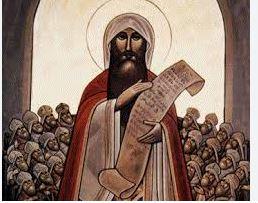Valentinus von Alexandria

Valentinus of Alexandria was an influential Christian theologian and Gnostic of the 2nd century, considered one of the most prominent representatives of the Gnostic movement. He is often referred to as the founder of Valentinianism, one of the most important Gnostic schools of early Christianity. Valentinus' teachings and writings were highly influential in his time, and many of his ideas have been preserved in the Gnostic Gospels and philosophical writings, particularly the Nag Hammadi writings discovered in 1945.
Key Aspects of Valentinianism:
Gnosis and Knowledge:
Valentinus was a representative of Gnosticism, a religious and philosophical movement that viewed knowledge (gnosis) as the key to salvation. In contrast to traditional Christian doctrine, which emphasized faith as the path to salvation, Gnosticism viewed knowledge as the decisive factor in saving the soul and liberating it from the material world.
Dualism and the Principle of Light and Darkness:
Valentinus and other Gnostics taught a dualism that divided the universe into two opposing principles: light (the spiritual world) and darkness (the material world). This doctrine declared the material world to be incomplete and flawed, and a place of imprisonment for the soul, which is supposed to yearn for its original spiritual home.
Valentinus believed that the gods and angels existed in the spiritual world in a state of unity and perfection, while the material world came into being through the apostasy of this divine unity.
The Role of the Demiurge:
Another central concept of Valentinianism is the idea of the Demiurge, a sub-god who created the material world but who is not the supreme God. The Demiurge is viewed as a kind of misconstruction or error who created the world from an imperfect state. In many Gnostic systems, the Demiurge is portrayed as evil or ignorant, which is the cause of the world's suffering and incompleteness.
Emanations and the Divine Hierarchy:
Valentinus developed a complex system of emanations emerging from the supreme God (the Unknown Father). These emanations are a kind of hierarchy of divine beings or principles that gradually became less and less perfect until the material world finally emerged.
In Valentinianism, there is an important divine pairing of male and female, with Sophie (Wisdom) worshipped as one of the highest emanations and as the divine feminine power.
Christian Interpretation:
Valentinus attempted to combine Christian doctrine with Gnostic concepts, presenting Jesus Christ as the savior who liberates humanity through secret knowledge (gnosis) and the revelation of divine truth. In his view, Jesus was not only a human savior but also a divine revelation who imparted true knowledge of the spiritual world and the universe.
Valentinus sees Christ as the divine revealer who imparts to believers the knowledge of the true origin and purpose of their existence in order to free them from the bondage of the material world.
Salvation through Knowledge (Gnosis):
For Valentinus, salvation was not a matter of faith or the grace of God in the traditional sense, but a matter of knowledge (gnosis)—the knowledge of one's true self, one's divine origin, and one's connection with the spiritual world.
Salvation did not occur through the observance of external rituals or moral commandments, but through the spiritual elevation of knowledge and the return to the divine source.
Writings and Influences:
Valentinus' writings have unfortunately been largely lost, but his ideas and teachings have been preserved in the writings of his students and opponents. Among the most important sources are the writings of Irenaeus of Lyons, who sharply criticized Valentinianism in his work "Adversus Haereses" (Against Heresies).
Some of his writings were rediscovered in the Nag Hammadi manuscripts, found in Egypt in 1945. These contain texts reflecting Gnostic and Valentinian ideas and serve as important sources for reconstructing his teachings.
Valentinus and the Early Christian Context:
Valentinus lived and taught during a time when Christianity was still in the process of developing and distinguishing itself from other religious and philosophical movements. Gnosticism was a widespread movement at this time, attempting to combine Christian teachings with other religious and philosophical traditions.
Valentinus was considered a heretic by many Christian leaders in the 2nd century, and his teachings were rejected by the established church. Nevertheless, his ideas had a profound influence on the development of Christian mysticism and Gnostic movements in early Christianity.
Summary:
Valentinus of Alexandria was a prominent Gnostic and Christian thinker of the 2nd century whose teachings shaped Valentinianism. He taught that salvation cannot be achieved through faith alone, but through knowledge (gnosis), and viewed the material world as flawed and created by an inferior god (the demiurge). For Valentinus, Christ was the divine revealer who gave humankind true knowledge of their divine origins and the universe, freeing them from the world of illusion.

